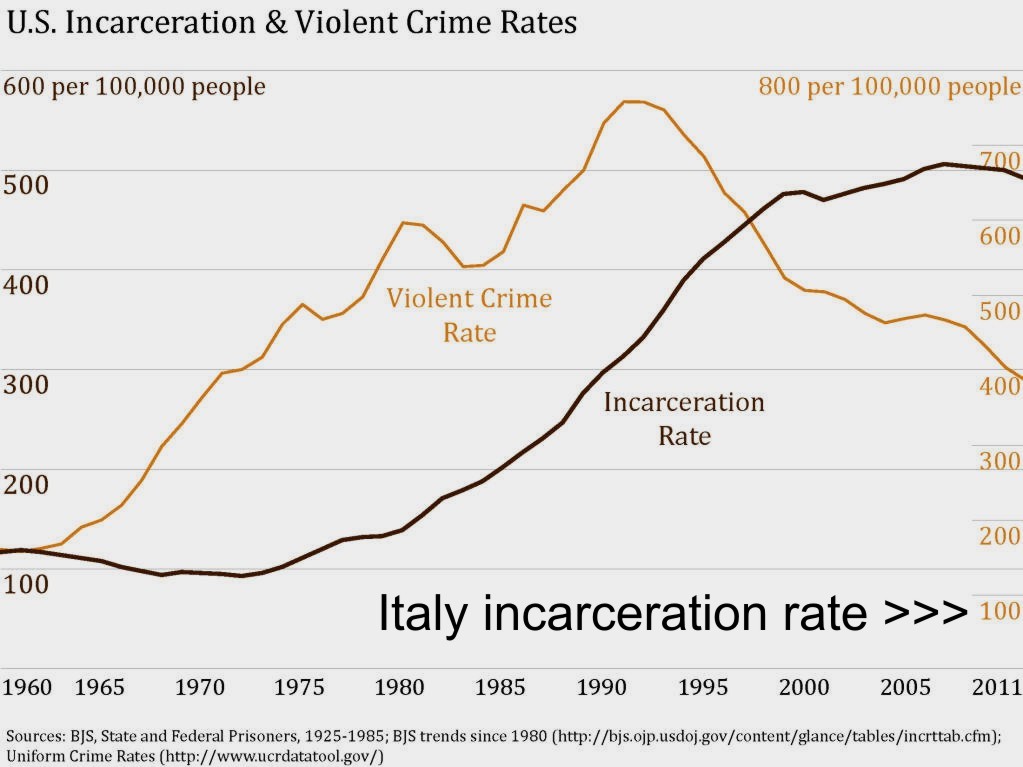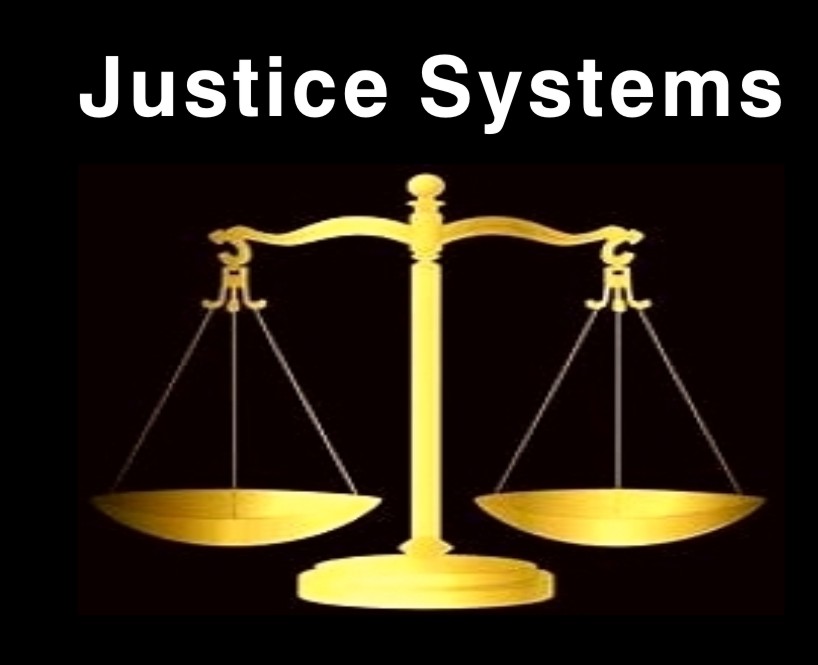
Why Italy Doesnt Look For Guidance On Justice System From Foreign Smartasses

Italy is following closely the sad disarray currently obvious in the American system
Read our numerous posts setting right for example the false claims of Michael Heavey and Steve Moore. And then read this post and this post and this post and these new stories on US justice. And then answer the question below.
Michael Schwanke: Koch behind push to overhaul criminal justice system
Each year it’s estimated the United States spends almost a $100 billion on prisons. According to Mark Holden, Senior VP at Koch Industries, that’s three to four times what the country spends on education.
Holden and Charles Koch authored a letter titled “The Overcriminalization of America” and now are behind a nationwide push to overhaul the criminal justice system.
The letter points to the many federal laws created over the years. “Congress creates, on average, more than 50 new criminal laws each year. Over time, this has translated into more than 4,500 federal criminal laws spread across 27,000 pages of the United States federal code.”
“We all agree that our system isn’t working. Whether you’re a conservative, evangelical, social liberal, progressive, or libertarian there’s something for you. I don’t think there will be a lot of negative reaction to it,” says Holden speaking to Eyewitness News after addressing the downtown Rotary.
Holden says the U.S. accounts for about five percent of the world’s population, but holds 20 percent of the prison population. Most are non-violent offenders. Holden says one in three people in the U.S. has a criminal record which leads to poverty and joblessness.
Cara Tabachnick: Poll: Young Americans have “little confidence” in justice system
Nearly half of American young adults lack confidence in the nation’s justice system or don’t trust their local police to do the right thing, though that perception is deeply divided by race, according to a national poll of 18- to 29-year-olds released by Harvard’s Institute of Politics at the John F. Kennedy School of Government.
African-American youth had the deepest distrust of the nation’s criminal justice institutions, with 79 percent of those polled expressing little to no trust in their local police department to do the “right” thing.
Hispanic youth weren’t far behind, with 62 percent of those polled expressing little or no trust in their local police force. In stark contrast, just 31 percent of the white youth polled expressed little or no trust.
More than 3,000 people were polled by the Harvard Institute of Politics between March 18-April 1, on questions of criminal justice and other issues, including politics, climate change and terrorism.
Over all, there was an even split on the U.S. judicial system’s ability to “fairly judge people without bias for race and ethnicity.” About 49 percent of those polled said they have little to no confidence that the justice system can operate without bias.
Jason Fyk: Baltimore’s Criminal Justice System Is Corrupt, I Know Because I Was Imprisoned there
n 2011, I was arrested by Baltimore City Police on charges of conspiracy to commit first degree attempted murder.
You might be asking yourself, “Why? What did he do?” I took a cell phone video of a small drunken scuffle in a downtown Baltimore parking garage. I was not a participant in the fight, nor was I an instigator. Despite what the facts of the situation presented, a personal family relationship with one of the so-called “victims” took precedence over the law. What started as a typical two-sided misdemeanor became a one-sided fight for freedom. I spent 50 days in the Baltimore City Detention Center facing two life sentences, and a host of other charges mounting to well over 200 years in prison, all for simply taking a video.
I’ve seen the corruption firsthand. I’ve seen how a law enforcement agent’s personal agenda can destroy a life. I’ve seen how charges are ramped up in order to make a lesser charge stick. I’ve seen detainees entering jail with worse injuries than the participants in the fight I captured on video, all at the hands of police. I’ve also seen the corruption that resides in BCDC on my 50-day tour of the jail.
The conditions at this facility were sub-human, in some cases. Ignoring the mice, cockroaches and decaying conditions, basic necessities of life were severely lacking. The food was nearly inedible and, in some cases, hazardous. For example, the drink flavoring had a poisonous emblem on it, eggs were often brown and rotten when served, and during my stay we even lost water for four days, which meant toilets and sinks did not work. All we had was a cooler jug that was brought in to drink from. Showers were so hot (not adjustable) you could not stand in the water. I saw a detainee drop on the floor, having a seizure from withdrawal, because drugs are not administered for close to a week after arrival. My experience in jail was that of an educated observant, and what I saw was appalling. The list goes on and on.
So Italy or the USA - which country would you pick to do a crime in? Do Heavey or Moore tell you this? How many times have Heavey and Moore found justice lacking in the US? Apparently no times at all. One-note bashing of Italian justice is all that they do.
Comments
Another: http://www.newsmax.com/Newsfront/zakaria-conrad-black-justice-system/2015/05/03/id/642294/
Another: http://qz.com/392342/native-americans-are-the-unseen-victims-of-a-broken-us-justice-system/
Another: http://www.presstv.ir/Detail/2015/05/02/409075/US-Justice-System-equality-African-Americans
There are plenty similar on many other countries as well.
Similar articles on Italy? Almost none at all.
@Peter
I love graphs. Let me stare for a minute at the graph you have nicely presented.
In 1960, the violent crimes and incarceration graphs both started with 100. And both climbed steadily (upto 750 and 500 respectively). The incarceration graphs has a 10 year start delay- perhaps it took about 10 years (good old days) for justice to be delivered. The peak in violent crimes occurred around 1992 but the peak in incarceration rate peaked around 2007- the 10 year lag in the early 60s has now become 15 year!
Violent crimes graph is quite rough- that is natural. But the incarceration graph is remarkably smooth- that suggests that judges were in no hurry- their delivery remained quite constant. Perhaps they were working at their peak capacity- perhaps. There were neither any major changes in the laws (that may make a difference).
Violent crimes are coming down at a rather steep rate (the upward slope and the downward slopes are rather similar)- from 1992 to 2012 it has come down from 750 to less than 400. This suggests that some key problems (the root causes) have been addressed sometime 1990 (perhaps 4-5 years before because the effect takes time to show up).
Going yearwise (whatever that may mean), from 1970-1990, the incarceration rate is about 1/3 the violent crime rate. I am rather unimpressed. However, if I allow a 10 year lag (for the delivery of justice), then the ratio is somewhat better, about 1:2. 50% of the violent criminals somehow escaped justice.
The picture is not really grim; I see hope and courage. The story of Jason Fyk is really sad; I do not know whether this is an exception or typical. Most likely the facility was being run by a contractor who has to serve many bosses. The rules are being made in consultation with the contractor (my guess).
I predict that large systematic changes are expected in the next 10-15 years.
Do you have similar data for Italy?
Hi Chami
Okay the graph gets voted to the top of the post! We dont have Italian trend data but trends show only a slight uptick all due to drugs, illegal immigrants, and some more prison space. Nothing dramatic.
A clear majority of all crime is committed in the poverty-stricken south and rates north of say the Amalfi coast and Naples are about the lowest in all Europe.
Those two criss-crossing trends for the US are being talked about here a lot now.
The downward trend in crime is not fully understood, there seems no easy cause such as “the bad guys were all locked up” but it is happening. Maybe all those most hard-wired for addiction all got killed off.
Meanwhile, policing methods are still mostly based on the war against drugs etc which was being lost prior to around 1990.
So crime gets less and less, but official pressure on police to meet arrest rates remains high, anyone who “looks like a perp” is harassed, and police/community relations are in tatters.
You are therefore right on both counts - the disparity in the two trends is systemic, and should disappear within 10 years.
No help from the Moores or Heaveys though. No recognition from them that Italy got there first and is actually the ideal that the US needs to head toward.
@Peter
Thanks for the details but remember that I am not an American and I have no firsthand information about the details of the dynamics of the crime and punishment.
I have not changed my mind about the European prisons being 5 star. Of course this is also second hand information. The nordic countries take the cake! In some prisons in Scandinavia, the prisoners walk in and out as if it their home.
All social changes take time. Things are slowly changing for the better all over the world. You can see the social churning nowhere better than in the middle east.
Happy Mothers’ Day to all the moms on TJMK and PMFs.
The “downward trend in crime” is welcome news. Maybe one cause is more Christian prison ministries since the Chuck Colson era. A mega-church I sometimes attend broadcasts the praise and worship services into dozens of correctional facilities in our state, every week.
They also organize visitation to prisons, which I find too terrifying to do. People who do social work among the prison population are perhaps the bravest and most humble people and deserve respect.
An overhaul of the prison system as Mr. Koch aims for would be marvelous. The U.S. could learn a lot from other countries about better prison programs. We obviously need to make changes. Italy has little to learn from us in this matter.
Where next:
Click here to return to The Top Of The Front PageOr to next entry Justice System Reform Is Suddenly Everywhere On The Front Burner
Or to previous entry Justice System Comparisons #3: Bail, Extradition, and More Crimes Under Common Law
